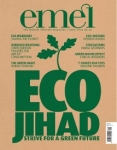Waste Management
Issue 57 June 2009
Yuyun Ismawati, 45, is an Indonesian environmental engineer who implements sustainable community-based waste and sanitation management programmes, providing employment opportunities to low-income people throughout the Indonesian archipelago, and empowering them to improve the environment. She is one of the recipients of the Goldman Prize, which honours grassroots environmentalists.
After graduating, I worked with a consultant firms in Bandung and Jakarta to design rural and city water supply systems. Seeing that my skills were not serving the poor communities most in need of safe waste management, I decided to make a career change. Since 1996 I have redirected my environmental engineering expertise to assist poor communities in designing safe and well-coordinated waste management initiatives. In June 2000 I founded my own NGO, Bali Fokus, to expand my community-based urban environmental management program into replicable initiatives for a larger area of Indonesia.
In 2003 my team at Bali Fokus initiated a solid waste management program consisting of a waste management facility owned and operated by the village itself. We recruited and trained local residents to operate the facility at the landfill site. Workers now separate waste into recyclables, compostable and residuals to transport to the dumpsite. Income from the sale of recyclable materials and compost benefit the local farmers.
I am driven by my care for future generations. I am a single parent with two bright daughters aged 19 and 13 whom I love deeply. In 2004 I developed the “decentralised solution initiative”, focusing on village households in a low-income urban area of Bali and other cities in Indonesia. I looked to housewives as my partners to develop community programs that reduce the volume of waste taken to municipal dumpsites by minimising household-level waste. Our core team trained housewives in easy-to-learn daily practices, such as waste separation and composting, performed at home using simple household tools. The program now involves 500 households. We estimate that household waste in the participating villages has been reduced by 50 percent. Some women sell their compost at local markets, thus creating a sustainable, income-generating practice for their communities. Recyclables are often crafted into sellable items, creating yet another income stream for local people.
Last year I was involved with national agencies in crafting Indonesia’s first ever bill on waste management relating to climate change issues. During this process I succeeded in moving the bill away from environmentally damaging practices such as incineration. However, I was detained at Bandung police office together with three colleagues for protesting. For this my three foreign colleagues were deported from Indonesia.
I have been involved in the development of Sanimas, which means “sanitation by communities”. Depending on a locality’s needs, resources and community-driven priorities, we and three other NGO partners provide education and capacity-building on specific sustainable waste management and sanitation programs. Infrastructure is often supported by local and central governments, but community contributions and participation are essential for the programs’ long-term sustainability. Sanimas is now a nationwide initiative reaching hundreds of locales across Indonesia, adding at least 75 small and medium-sized cities to the program every year.
Click here to return to main article
Bookmark this |
|
Add to DIGG |
|
Add to del.icio.us |
|
Stumble this |
|
Share on Facebook |
|
Share this |
|
Send to a Friend |
|
Link to this |
|
Printer Friendly |
|
Print in plain text |
|


Comments
0 Comments